Protected Cropping Australia has again put on a successful grower day in the Western Sydney region of New South Wales.
Sixty PCA members came from all over the New South Wales, Queensland and Victoria to network and learn about greenhouse production under different screens, glass, and covers as well as pollination and tertiary education opportunities.
Getting to walk around together inside a wide cross-section of different types of greenhouses, hydroponic growing systems, crops and business operations was extremely informative and thought-provoking.
The day started at the Western Sydney University (WSU) with three very informative talks. WSU Associate Professor David Tissue spoke about “Novel glass for horticultural production” and focused on Smart Glass and the university’s collaborated research with Swinborne University
After which WSU Associate Professor Richard Spooner-Hart spoke about his “Pollination research with native bees in protected cropping”.
Lastly, WSU Associate Professor Zhong-Hua Chen explained their “Tertiary Pathway and Masterclasses” to educate and train future professional growers for the protected cropping industry.
After the three speakers, all the guests were given a tour of the WSU Hi-Tech Glasshouse and Training facility by Scott Featherston of AIS Greenworks.
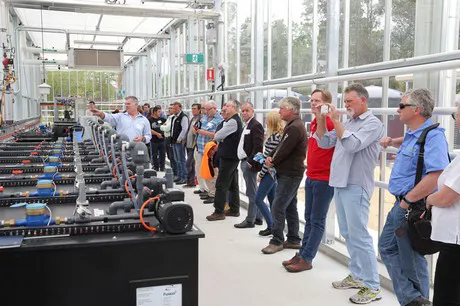 Scott Featherston of AIS Greenworks explained in detail how they fitted out the state of the art, hi-tech WSU glasshouse and its eight growing chambers to PCA members.
Scott Featherston of AIS Greenworks explained in detail how they fitted out the state of the art, hi-tech WSU glasshouse and its eight growing chambers to PCA members.
PCA members were provided an overview of the current crops and projects including the dynamics of constructing, managing and measuring every aspect of the eight distinct growing compartments, features, irrigation, mixing tanks and environmental control systems.
The questions from different people in the group were as intriguing as the answers.
“Why don’t you test the pH of the drain water?” and “Where do you see the industry in 5 – 10 years’ time?”
Both Associate Professor David Tissue & Robert Spooner-Hart further explained in more detail their studies and research methods within this unique facility.
Phil Richie from Rijk Zwaan also addressed the group on their eggplant variety production cycle and the enormous potential for the crop in such hi-tech systems.
The tour group then gathered for the PCA’s Annual General Meeting which showed a vastly improved organisational structure including the new constitution, modern governance manual, detailed five-year strategic plan and a board focused on taking the organisation soundly into the future to serve its members and maintain relevance.
The Costa PCA Conference 2019 was promoted and members were strongly encouraged to get everyone they know to come along to this huge event and opportunity to network and learn, 7 – 10 July 2019. More information is available at www.pca2019.com.
AIS Greenworks kindly sponsored lunch for the 70 guests with a delicious spread of healthy, fresh sandwiches, wraps, fresh fruit and cold drinks.
After lunch, they all walked 100m across the lawn for a tour of Greening Australia and heard from the horticultural manager Robert Peprahs.
This was a fascinating visit to see and learn how they propagate and grow over 200 native shrubs and trees in medium tech greenhouses to ‘green Australia’.
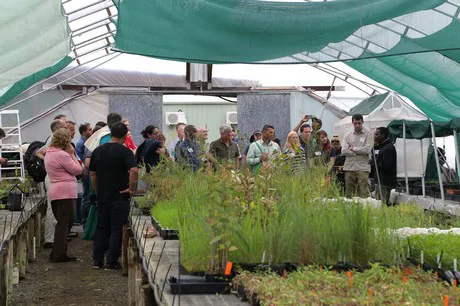 Robert Peprahs (far right) hosted PCA members at Greening Australia, who propagate natives.
Robert Peprahs (far right) hosted PCA members at Greening Australia, who propagate natives.
Everyone then jumped on a bus for a short 15 minute drive to visit PCA members Jimmy & Lucy Azzopardi and their four children’s medium tech tomato farm in Londonderry.
It was another thought-provoking and interesting visit as Jimmy and Lucy shared their story and showed other farmers what crops and hurdles they’ve gone through.
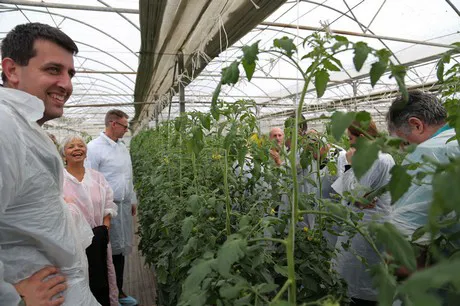 PCA members L-R Ibrahim El Saliby (Royal Botanical Gardens), Priti Krishna (WSU), Marcus van Heijst (Priva & PCA Director) enjoying the visit to Jim Azzopardis (centre) medium-tech tomato greenhouse.
PCA members L-R Ibrahim El Saliby (Royal Botanical Gardens), Priti Krishna (WSU), Marcus van Heijst (Priva & PCA Director) enjoying the visit to Jim Azzopardis (centre) medium-tech tomato greenhouse.
The Azzopardis have tried nearly everything from fancy lettuce to cucumbers and now tomatoes.
They grow two tomato crops a year and each time in fresh pine sawdust sourced locally, and inexpensively.
Their best trick is adding a compost tea to the nutrient which dramatically reduces pest and disease issues.
This was a very relatable visit for many growers seeing small family business putting everything into it without any extra staff and doing very well. They even have time to attend many of PCA events, tours and educational opportunities.
Lucy Azzopardi said, “It was nice to share our story, and show other farmers what we go through. Hopefully, they got some helpful information, to help them along the way. Farming has always got its challenges.”
The fourth and final visit for the day was to Peter Muscat’s nutrient film technique (NFT) fancy lettuce farm in nearby South Windsor.
Noteworthy was Peter’s attitude to seeding and propagating his own lettuces so as not to introduce pathogens, insects or diseases to this property. This was obviously working as it was exceptionally clean of pests and diseases, and his customers value the quality, vigour and long shelf life.
Another striking observation was Peter’s attention to his market by supplying a larger and superior lettuce head in order to survive in a highly competitive market against salad mix that wholesales for $5 – $6 per kilo.
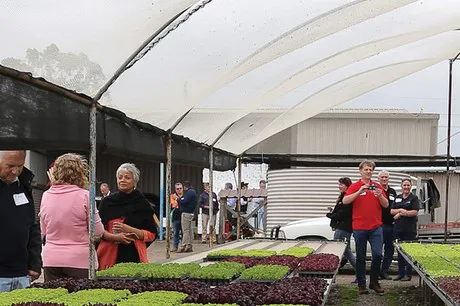
Peter Muscat propagates his own lettuce seedlings on-site so as not to introduce pathogens, insects or diseases to this property.
Peter said that once the initial capital investment of the NFT system and solar power system was recouped, only packaging expenses were his biggest problem.
Town water only costs 27c per 1,000 L and the biggest advantage of hydroponics was not having to worry about crop rotation. There are no soil-borne diseases and after 35 – 40 years, no more capital costs. The odd pump breaks down, but if you keep the farm clean then running costs don’t compare to set-up costs.
Solar power helps reduce Peter’s energy costs and it paid for itself within four years. He has several 5,000 litre underground water tanks and on the whole finds NFT lettuce is quite forgiving. He harvests within 28 days, but sometimes an extra five days produces a much larger product, amazingly quickly.
By growing his own seedlings and for only four hours extra work, Peter saves $500 per week compared to buying them in from elsewhere. It also gives the added protection from incoming disease.
Matthew Plunkett and Sylvia Jelinek of Local Land Services Greater Sydney addressed the group about their methods and successes connecting growers with research and developments.
PCA gratefully acknowledges the sponsors for the day which included AIS Greenworks, Powerplants, Apex Greenhouses, Local Land Services in conjunction with the National Vegetable Extension Network, Western Sydney University, Hort Innovation and NSW Primary of Industries.
For more information: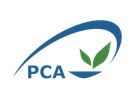 Protected Cropping Australia
Protected Cropping Australia
0414 333 996
admin@protectedcroppingaustralia.com
www.protectedcroppingaustralia.com
